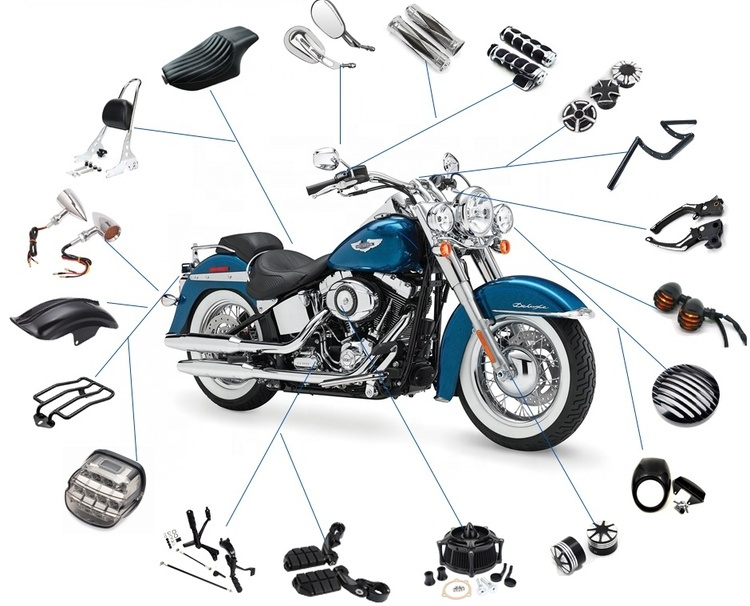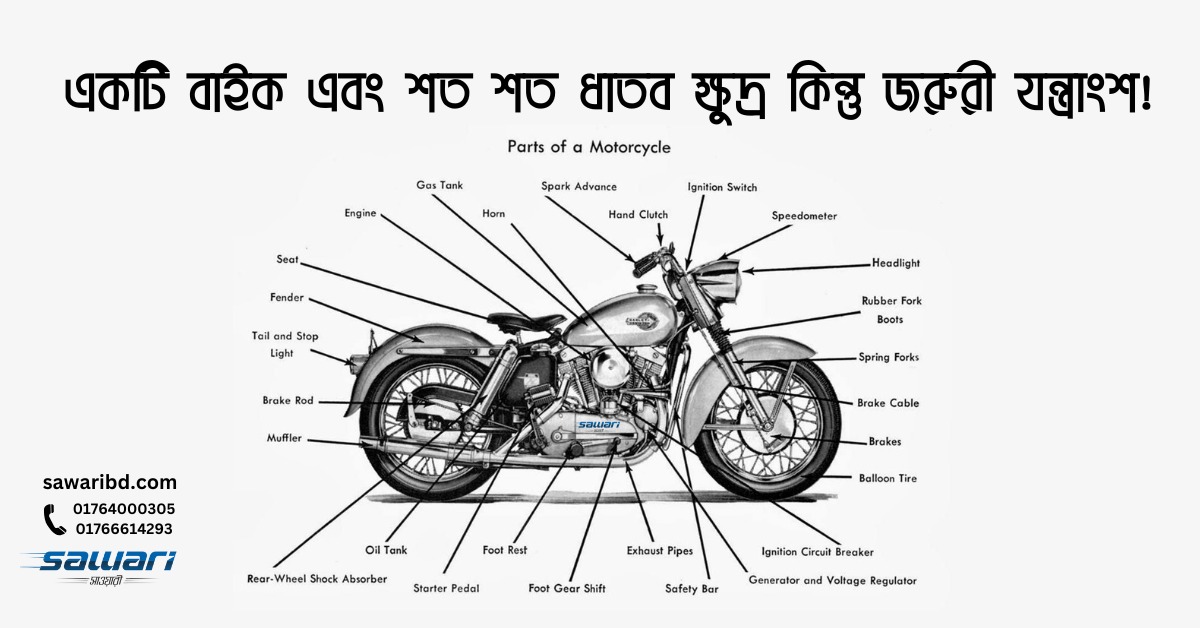Most Commonly Replaced Motorcycle Parts Auckland for Riders in NZ
Most Commonly Replaced Motorcycle Parts Auckland for Riders in NZ
Blog Article
Discover the Essential MotorBike Components You Required for Optimal Performance
Recognizing the vital parts of a motorcycle is fundamental for attaining peak efficiency. Each component, from the engine to the braking system, plays a crucial function in total functionality and security. Normal upkeep can prevent unforeseen failings and boost the riding experience. Nonetheless, numerous motorcyclists forget the details of these systems. Uncovering how they collaborate can result in a much more effective adventure. What crucial components should every biker prioritize?
The Engine: The Heart of Your Motorcycle
The engine works as the core element of a motorbike, driving its performance and defining its capabilities. It is responsible for converting fuel into power, which powers the bike forward. Various sorts of engines are employed, consisting of single-cylinder, V-twin, and inline configurations, each offering distinct characteristics fit for different riding designs and purposes. The engine dimension, typically measured in cubic centimeters (cc), considerably influences efficiency, with bigger engines typically offering more power and torque.Furthermore, the engine's layout and modern technology, such as gas injection systems or air-cooling versus liquid-cooling, affect performance and integrity. Maintenance is vital for peak operation; variables like regular oil changes and monitoring ignition system warranty long life. Bikers typically consider an engine's responsiveness and level of smoothness, as these qualities improve the overall riding experience. Ultimately, the engine continues to be an essential aspect that defines not just the motorbike's efficiency however additionally the cyclist's connection to the machine.
The Transmission: Moving Gears Smoothly
The transmission plays a crucial function in a motorcycle's efficiency, particularly in the auto mechanics of gear changing. Recognizing exactly how to change gears smoothly can improve the overall riding experience, while routine upkeep assurances peak functionality. Appropriate attention to these elements can greatly impact the long life and efficiency of the motorbike.

Equipment Shifting Mechanics
Smooth gear shifting is essential for suitable motorbike performance, substantially affecting both velocity and control. The mechanics of gear moving entail the interaction between the clutch, equipment bar, and transmission system. When a biker involves the clutch, it disengages the engine from the transmission, enabling a gear adjustment without harming the components. A well-timed launch of the clutch, incorporated with accurate motion of the equipment bar, assists in a smooth adjustment between equipments. This process guarantees that the engine operates within its finest power band, boosting efficiency. Bike Parts Wellington. In addition, understanding the gear ratios and their effect on speed and torque can assist bikers make notified choices throughout changes, inevitably adding to a much more receptive and enjoyable riding experience
Maintenance Tips Significance
Routine maintenance plays a crucial duty in guaranteeing that the transmission system runs effectively, enabling for smooth equipment shifts. On a regular basis examining and transforming the transmission fluid is important, as old fluid can result in enhanced friction and wear. Additionally, examining the clutch for wear guarantees peak engagement and disengagement, avoiding slippage during equipment adjustments. Lubrication of relocating parts is equally vital to decrease rubbing and enhance efficiency. Motorcycle proprietors need to additionally check for leakages and unusual sounds, as these can suggest underlying issues. By adhering to these upkeep tips, riders can lengthen the life-span of their transmission system, assuring that gear changes stay seamless and adding to the overall efficiency of their motorbike.
The Braking System: Ensuring Security on Every Ride
Braking systems are essential components that straight affect a motorcycle's safety and efficiency. They contain numerous parts, including brake pads, blades, calipers, and hydraulic lines, all collaborating to ensure effective slowdown. The type of stopping system-- commonly either disc or drum-- impacts responsiveness and quiting power.Regular maintenance is necessary to promote peak performance; worn brake pads can cause reduced efficiency and boosted quiting distances. Furthermore, the top quality of brake fluid need to be checked, as it can absorb wetness with time, jeopardizing stopping efficiency.Riders should additionally consider the relevance of anti-lock braking systems (ABDOMINAL), which protect against wheel lockup during abrupt quits, enhancing general safety and security. Correctly working brakes are not practically stopping; they impart confidence in the rider, permitting much safer navigation with numerous terrains. Eventually, a trusted braking system is important for enjoying every ride with assurance.
The Suspension: Enhancing Comfort and Control
A well-functioning suspension system significantly contributes to a motorbike's total efficiency, enhancing the performance of the braking system. The suspension plays a considerable function in absorbing shocks from uneven surface areas, ensuring a smoother trip while maintaining tire call with the roadway. This get in touch with is vital for both stability and control, allowing riders to browse edges with confidence and precision.Different kinds of shock absorber, such as telescopic forks or mono-shocks, use varying degrees of convenience and handling. Properly tuned suspension enhances responsiveness, giving the motorcyclist with a much more connected feeling to the motorbike. Normal maintenance checks are essential to ascertain the suspension elements, consisting of springtimes and dampers, are functioning at their best. An efficient shock absorber not only boosts the riding experience however also adds to the durability of various other motorbike components by reducing damage. Consequently, purchasing high quality suspension is vital for any type of serious motorcycle enthusiast.
The Tires: Linking You to the Road
Tires play a crucial function in a motorcycle's performance, working as the primary web link in between the biker and the roadway. Understanding the different kinds of tires available can considerably impact managing and safety. Furthermore, normal maintenance is important to assure peak tire efficiency and longevity.
Tire Enters Explained
Just how do different tire types influence a motorcycle's efficiency? Tire kinds play an essential duty in determining a motorbike's handling, security, and grip. Sport tires, made for high efficiency, offer enhanced traction and responsiveness on paved roads, making them optimal for competing and hostile riding. Conversely, touring tires prioritize toughness and convenience, providing a smoother ride for long-distance travel. Off-road tires, characterized by their rugged tread patterns, master traction on unpaved surfaces, suitable for adventure enthusiasts. Additionally, dual-sport tires blend attributes from both on-road and off-road categories, satisfying versatile riding needs. Ultimately, selecting the right tire type is vital for enhancing performance, making sure security, and improving the overall riding experience.
Maintenance Tips Offered
While riding on read what he said the road, keeping excellent tire problem is crucial for Motorcycle Spares Christchurch security and performance. Regularly examining tire stress is crucial, as under-inflated tires can result in poor handling and raised wear. It is suggested to check tread deepness often; used tires concession grip and stability. Furthermore, bikers should seek indications of damages, such as splits or bulges, which can suggest the requirement for substitute. Revolving tires occasionally assures also use, boosting longevity. Maintaining tires tidy from debris and preventing extreme visuals can prolong their lifespan. Finally, preserving proper positioning and equilibrium adds to come to a head performance, minimizing stress on other bike components. Following these upkeep ideas will considerably improve the overall riding experience.
The Gas System: Fueling Efficiency and Performance
The gas system plays a crucial role in taking full advantage of a motorbike's efficiency and efficiency, as it assures the optimal shipment of fuel to the engine. It makes up several essential components, including the gas tank, gas pump, gas filter, and gas injectors or carburetor. Each component must operate successfully to assure a smooth and powerful ride.The gas storage tank shops fuel and provides it to the engine by means of the fuel pump, which generates the necessary stress. A fuel filter stops impurities from entering the engine, while the injectors or carburetor mix gas with air for combustion.Proper upkeep of the gas system is crucial; a blocked filter or malfunctioning injector can result in lowered performance and raised gas usage. By confirming that the fuel system operates effectively, riders can take pleasure in enhanced throttle feedback, much better fuel economic climate, and on the whole enhanced riding experience.
The Electric System: Powering Your Experience
A reliable electric system is essential for the overall performance and safety of a motorcycle, as it powers essential elements such as the ignition, lighting, and different electronic systems. This system consists of the battery, which stores power, and the generator, in charge of generating power while the engine runs. The wiring harness attaches these components, guaranteeing reputable power distribution.Additionally, fuses shield the system from overloads, while relays aid manage high-current tools with low-power signals. A properly maintained electrical system improves efficiency by ensuring smooth begins and regular procedure of signals and lights, vital for rider exposure and safety.Regular checks of the battery's fee and connections are very important for avoiding electrical failures. Motorcyclists must additionally inspect electrical wiring for deterioration, guaranteeing all parts function ideally. Inevitably, a durable electrical system contributes significantly to the general performance and dependability of the motorcycle.
Often Asked Concerns
How Usually Should I Change My Motorcycle's Battery?
The regularity of bike battery substitute depends upon usage and maintenance (Oem Parts New Zealand). Normally, batteries ought to be changed site here every three to 5 years. Routine checks can assist identify when a substitute is necessary for peak efficiency
What Devices Do I Need for Fundamental Bike Maintenance?
For basic motorbike upkeep, one calls for vital devices such as an outlet collection, wrenches, screwdrivers, pliers, tire stress scale, and a torque wrench. These tools facilitate efficient maintenance and assure the bike runs efficiently and safely.
How Can I Improve My Motorcycle's Aerodynamics?
To improve motorbike aerodynamics, one ought to think about changing fairings, utilizing windshield extensions, enhancing body setting, and decreasing general weight. These adjustments assist decrease drag, enhancing stability and gas performance throughout adventures.
What Are the Indicators of a Failing Electric System?
Indications of a failing electric system consist of lowering lights, trouble beginning, uneven tool analyses, and blown fuses. Motorcycle Parts Auckland. Unusual scents or rust around battery terminals might also show underlying concerns needing prompt interest for safety and performance

Just how Do I Pick the Right Oil for My Bike?
When selecting oil for a motorcycle, one should consider the manufacturer's requirements, thickness scores, and the kind of riding. Furthermore, synthetic versus traditional oil can influence performance and engine defense, influencing the decision significantly. The engine size, generally measured in cubic centimeters (cc), considerably influences performance, with larger engines generally giving even more power and torque.Furthermore, the engine's style and innovation, such as gas injection systems or air-cooling versus liquid-cooling, influence efficiency and reliability. A well-functioning suspension system considerably adds to a motorbike's total efficiency, enhancing the performance of the braking system. The fuel system plays a vital duty in making the most of a motorcycle's efficiency and performance, as it guarantees the ideal shipment of gas to the engine. A fuel filter stops contaminants from entering the engine, while the injectors or carburetor mix fuel with air for combustion.Proper upkeep of the gas system is critical; a clogged filter or malfunctioning injector can lead to lowered efficiency and enhanced fuel consumption. A well-maintained electrical system improves efficiency by ensuring smooth begins and constant operation of signals and lights, crucial for rider visibility and safety.Regular checks of the battery's fee and connections are vital for avoiding electric failures.
Report this page